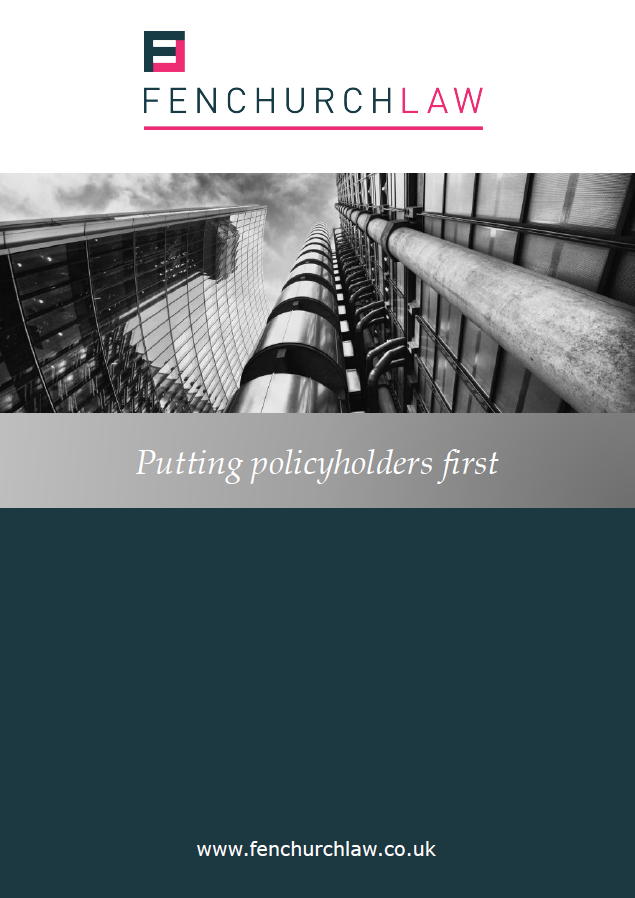
Coronavirus – Am I Covered? A Routemap to Recovery for Policyholders, Part 2
Part 1 of this review examined the availability – or otherwise – of cover for losses under Business Interruption and Event Cancellation insurance. With the UK government now moving to follow other countries in restricting, but not yet banning, mass gatherings and personal interaction, those policies remain firmly in the spotlight.
However, given the potential obstacles to recovery highlighted in Part 1, and the far-reaching consequences of the pandemic that are only just starting to become apparent, businesses will inevitably incur many other direct and indirect losses that will not fall for coverage under these first response policies. Part 2 of our review therefore investigates what coverage for COVID-19-related losses may be available elsewhere under a variety of other policies.
A general caveat is that these are specialty commercial lines of business, which are often highly bespoke and tailored to the risk in question. Whilst we have highlighted some of the issues that we anticipate arising, any question of coverage will be entirely dependent on a detailed review of the facts in the context of the policy wording.
Trade Credit
What might be covered?
With global markets tumbling and the FTSE 100 at its lowest level since 2008 at the time of writing, the economic consequences of COVID-19 look set to be universally felt, and not just by front line industries such as travel, hospitality, entertainment and sports. As supply chains are disrupted and customer funds are squeezed, credit arrangements and solvency margins across all sectors will be severely stress tested.
Businesses with trade credit insurance may be protected from customer defaults within specified criteria, cushioning them from the indirect effects of COVID-19 on their cashflow.
What are the difficulties?
The cover here is narrow and limited specifically to customer defaults. Trade credit insurance will provide no protection for losses suffered as a result of supplier insolvency or a general downturn in the market.
A further issue is that coverage of customer defaults in COVID-19 circumstances may be affected by force majeure provisions in the underlying contracts, governmental actions in relieving contractors from their payment obligations in certain sectors, or (in common law jurisdictions) arguments of contract frustration. Where any of these mechanisms acts to relieve the customer of their contractual obligations, or extends payment periods, it may be arguable, depending on the policy wording in question, that there has been no default and that the policy does not therefore respond.
Political Risk
What might be covered?
Often setting side by side with trade credit insurance, political risk insurance can provide coverage for broader – although highly tailored – circumstances affecting a business’ investments, usually in cross-border circumstances, where the regulatory, economic or political environment is considered to be sufficiently volatile to require a degree of risk transfer. Political risk policies respond to specific triggers including expropriation, currency inconvertibility, and contract frustration.
Where trade credit policies fail to respond to defaults due to force majeure or frustration, political risk policies may potentially step in to bridge the coverage gap, particularly where payment defaults are the direct result of government intervention. For example, in China the Council for the Promotion of International Trade has already issued force majeure certificates worth over $53 billion to relieve businesses of specified contractual payment obligations at a local level. However, the effects of such actions on the underlying contracts will need to be analysed under local and applicable international laws in order to understand the impact on cover under any political risk policy.
Depending on how broadly the insuring clauses are drafted, other governmental edicts such as travel bans, restrictions on public gatherings, and closures of public places may also potentially trigger political risk coverage.
What are the difficulties?
Although there may be ‘silent’ cover to be found in political risk policies, the product is generally not designed specifically to protect businesses from pandemics or circumstances outside the control of government. Broadly drafted exclusions and narrowly drawn insuring clauses may therefore limit the recoverability of losses under the policy, even where losses may be linked to government actions taken in response to the COVID-19.
Environmental Risk
What might be covered?
Whilst standalone environmental policies are generally intended primarily to respond to cleanup costs and third party liabilities arising from pollution or contamination events caused by the insured business, there may be limited cover provided for disinfection or decontamination costs associated with an outbreak of an infectious disease at the insured premises.
What are the difficulties?
Again these policies are highly specialised, with significant variance and no standard coverage. Where coverage is provided for decontamination or disinfection of premises, the trigger is likely to require an outbreak on or near the insured premises; costs of prophylactic cleansing are unlikely to be covered. Some policies may only be triggered where decontamination is required by order of a competent regulatory authority.
Similarly to our earlier discussion of event cancellation and BI covers, the policy may provide an express list of covered or excluded infection diseases which will determine whether the policy responds to COVID-19.
Contaminated Products / Product Recall
What might be covered?
If a manufacturer of food & beverage or other consumer products suffers an outbreak of COVID-19 at their factory or elsewhere in the supply chain, leading to concerns over possible contamination, a decision may be taken to recall the potentially affected products. If Contaminated Products or Product Recall Insurance is in place, cover may be provided for the manufacturer’s own costs incurred in recalling the products, as well as costs of managing the reputational damage, and potentially cover for loss of profits caused directly by the recall.
What are the difficulties?
The policy trigger will usually require a reasonable expectation that the use or consumption of the products will cause bodily injury, sickness or death. In the case of a COVID-19, which appears to be transmitted by contact with infected persons rather than by consumption of contaminated products, it may be challenging for the insured to prove as a matter of fact that the coverage is triggered. The insuring clause will need to be examined carefully, as language such as ‘may cause’, ‘would cause’, or ‘likely to cause’ will all set different bars to be met. In any case, voluntary recalls carried out primarily as brand protection exercises, where there has been no actual contamination, will not usually be covered.
Product Liability
What might be covered?
In the event that a contaminated product in the recall scenario considered above should actually infect consumers, this could obviously lead to personal injury claims that would fall for coverage under a product liability (or general public liability) policy. However, given the apparent mode of transmission of the virus, as well as the likely causation difficulties that would arise, the likelihood of these type of claims may be remote. Any significant exposure is more likely to lie with manufacturers of pharmaceutical, medical and sanitary products used to prevent transmission or treat the symptoms of the virus, which may be alleged to be defective in failing to prevent or treat the illness, or by causing side effects.
What are the difficulties?
As with public liability claims (which may be covered under the same general liability policy), pollution exclusions may be relevant. More importantly, coverage issues are likely to arise in respect of any claims regarding the products’ efficacy i.e. their ability to perform the intended task of preventing transmission or treat symptoms. Many policies will contain efficacy exclusions, meaning that only liability for injury or damage caused by the product would be covered, not for the product failing to fulfil its intended or advertised function. In that case, a claim for injury caused by side effects of a medicine or vaccine would likely be covered, whilst a claim that a vaccine or device had failed to prevent infection, or that a medicine had failed to treat or cure the illness, would normally not.
D&O
What might be covered?
In the face of direct operational restrictions, and in the shadow of an imminent recession, all businesses face stark choices about how best to continue trading and manage the myriad difficulties. As share prices tumble and markets contract, some businesses will inevitably fail to survive, particularly where insurance cover is absent or inadequate to cover losses caused directly and indirectly by the COVID-19 crisis.
Directors of companies may find themselves in the firing line for failing in their duties to manage the company for the benefit of the shareholders, or for misleading investors by failing disclose the nature and extent of the business’ exposure. In insolvency situations, D&O policy limits may be seen as a potential source of recovery for disgruntled shareholders and liquidators seeking to maximise assets for distribution to creditors.
What are the difficulties?
Most D&O policies will contain a bodily injury exclusion, the effect of which will depend on how broadly the exclusion is drafted. Those with ‘absolute’ wording (e.g. ‘based upon, arising out of, directly or indirectly resulting from or in consequence of, or in any way involving bodily injury’) may give rise to coverage challenges in the context of claims flowing from COVID-19, whilst those drafted on a narrow basis (‘for bodily injury’) are unlikely to act as a bar to recovery.
Similarly, pollution or contamination exclusions may come into play, depending on the facts of the claim and the wording of the exclusion. Although these exclusions were introduced primarily to avoid exposure to cleanup costs following environmental disasters, any exclusion using ‘absolute’ wording may potentially be argued to exclude follow-on claims arising from COVID-19-related losses.
Public and Employers’ Liability
What might be covered?
Any business with public exposure, and all businesses with employees, may have concerns over potential liability issues arising from an outbreak, particularly where a decision is taken not to cancel gatherings or events. Establishing causation will be a significant and perhaps insurmountable hurdle for any employee or member of the public seeking to establish liability for illness or even death caused by COVID-19, in that it seems unlikely to be possible to prove when and where the disease was contracted. Nonetheless, it is certainly conceivable that claims may be brought, particularly in more litigious jurisdictions. If so, defence costs at the very least should be covered under the appropriate public or employers’ liability policy.
What are the difficulties?
As in the case of D&O, public liability policies often include pollution exclusions which, if widely drafted, may potentially bar coverage of claims made in respect of COVID-19 contamination and infection. If excluded under a company’s public liability insurance, cover may instead be provided under any standalone environmental insurance that has been purchased.
As a compulsory insurance in the UK, Employers’ Liability cover tends to be more standardised and give rise to fewer coverage issues. However, potentially relevant exclusions include intentional or reckless acts, which might be invoked where an employer is accused of knowingly or recklessly exposing its employees to infection, or failing to protect them
Comment
This is a far from comprehensive review of the coverages that may or may not be available to meet the wide-ranging losses that may be suffered by businesses in connection with the spread of the COVID-19 virus, but it can be seen that all industry sectors and lines of insurance business are likely to be affected, with many potential overlaps and gaps in coverage.
As with the advent of any novel peril, there is no single insurance product designed to address the losses caused by the COVID-19 pandemic, and businesses should therefore consult with their advisors to investigate the availability of cover in their existing programs, and just as importantly to ensure that notification and other claims conditions are complied with in a timely manner.
Other news
Fenchurch Law expands into Scandinavia with Denmark office launch
31 October 2024
Fenchurch Law, the award winning international law firm working exclusively for insurance policyholders and brokers,…



